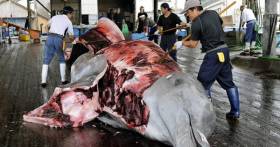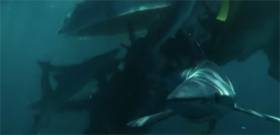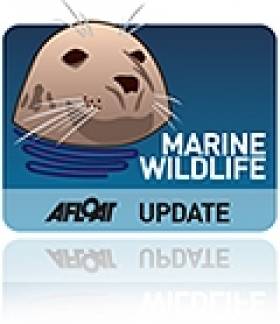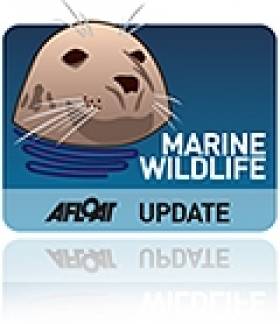Displaying items by tag: Whaling
Whaling in Japan Resumes Commercially
Today a small Japanese fleet caught their first whales in the nation's first commercial hunt in more than three decades, a move that has aroused global condemnation and fears for the fate of whales.
Japan RTE reports has long said few whale species are endangered and announced in December it was leaving the International Whaling Commission (IWC) to resume hunting after years of campaigns by industry supporters and Prime Minister Shinzo Abe, whose constituency includes a city that has long whaled.
"If we had more whale available, we'd eat it more," said Sachiko Sakai, a 66-year-old taxi driver in Kushiro, a port city on the northernmost main island of Hokkaido, where five whaling ships were waved out of harbour in a brief ceremony early this morning.
"It's part of Japan's food culture," said Sakai, adding that she ate a lot of whale as a child. "The world opposes killing whales, but you can say the same thing about many of the animals bred on land and killed for food."
For more click here including a history of whaling in Japan
#MarineWildlife - Sharks have been filmed devouring a whale carcass at the ocean's surface in waters close to Britain and Ireland for the first time.
The results of the documentary expedition were broadcast last Friday as part of the UTV series Britain's Whales, available for catch-up the rest of this week.
As the Plymouth Herald reports, the groundbreaking experiment was headed by West Country marine biologist Dr Nicholas Higgs along with presenters Ellie Harrison and Ben Fogle, who sailed out to the Celtic Deep between Ireland, Cornwall and Wales with the carcass of a humpback whale in tow.
Their documentary crew were then able to film an "unprecedented" feeding frenzy by hundreds of blue sharks before the carcass was sunk for further study to examine the various creatures, from sharks to tiny 'zombie worms', that thrive on dead cetaceans as they drop to the ocean floor.
"I would never have predicted that you'd have this many sharks eating this much of the whale at the surface," said Dr Higgs. The Plymouth Herald has more on the story HERE.
In other cetacean news, Japan has disappointed global authorities by confirming hundreds of whale kills on its most recent expedition to the Antarctic.
Some 333 minke whales, including pregnant females, were poached between since December and last Friday (25 March), according to the Guardian.
As previously reported on Afloat.ie, Ireland recently joined an international demarche expressing "serious concern" at Japan's decision to resume whaling for what it claims are scientific purposes, claims that are not supported by the International Whaling Commission.
Ireland Joins Demarche To Japan Over Whaling Plans
#MarineWildlife - On Monday 7 December, Ireland today joined with a number of other countries in a demarche to the government of Japan about its whaling activities.
The demarche expresses “serious concern” at Japan's decision to resume whaling in the Southern Ocean under what it calls its “New Scientific Research Whale Programme in the Antarctic Ocean (NEWREP-A)”.
The demarche recalls the decision of the International Court of Justice in 2014 which held that Japan’s previous Southern Ocean whaling programme was not “for purposes of scientific research” under the International Convention for the Regulation of Whaling 1946 and was therefore unlawful.
The countries participating in the demarche note that the last Annual Meeting of the Scientific Committee of the International Whaling Commission held in June 2015 was unable to confirm that Japan had done enough to justify commencement of lethal sampling in the 2015/16 season.
In expressing concern to Japan, Ireland and the other participating countries urge the government of Japan as a member of the International Whaling Commission to respect the commission’s procedures, stress that there is no scientific basis to include lethal methods in NEWREP-A, and strongly request the government of Japan not to engage in this whaling programme.
Other member states of the EU and New Zealand also participated in the joint demarche.
Japan To Resume Whaling Despite Court Ruling
#Whaling - Japan is set to resume whaling for minke whales off Antarctica in the new year in spite of a ruling by the International Court of Justice banning such activity.
According to BBC News, Japan says it has taken the court's decision into consideration – and maintains that it will only resume whaling in the Southern Ocean for "scientific" purposes.
But Australia, which won its case against Japan at the International Court of Justice in 2014, has restated its opposition to the move, with the country's environment minister Greg Hunt saying: "We do not accept in any way, shape or form the concept of killing whales for so-called 'scientific research'."
As previously reported on Afloat.ie, Irish marine research was cited by an expert panel at the International Whaling Committee that struck down Japan's 'scientific whaling' plan for lacking detail to determine how many minke whales would be hunted and for what exact purpose.
BBC News has more on the story HERE.
Irish Research Cited In Experts' Rejection Of Japan Whaling Plan
#MarineWildlife - A research paper produced in a joint project by the Irish Whale and Dolphin Group (IWDG) and the Galway-Mayo Institute of Technology (GMIT) was cited by an expert panel that has struck down Japan's plans to resume whaling in the Southern Ocean.
As the Guardian reports, the International Whaling Committee (IWC) panel said Japan's revised programme did to have enough detail to determine whether it needed to hunt whales in order to, as per its reasons, measure population sizes ahead of any return to commercial whaling, or gain "a better understanding of the Antarctic marine ecosystem".
"The current proposal does not demonstrate the need for lethal sampling to achieve those objectives," said the IWC experts' report.
The IWDG-GMIT paper lead authored by Dr Conor Ryan and published in Marine Ecology Progress Series in 2013, which details the collection of relevant data from live biopsy tissue samples, was cited by the experts as evidence contrary to Japan's assertions.
Japan was forced to revise its whaling programme in the face of controversy last year after the International Court of Justice ruled it was not whaling for scientific research purposes.
The IWDG says that the IWC's report "endorses the internationally significant work being carried out in Ireland and shows how this information can be used to inform important management decisions such as that offered by the IWC Expert Panel."
Other recent research work conducted by the IWDG includes a visual and acoustic survey of cetaceans during the annual Marine Institute bus whiting survey, and a review of the National Parks and Wildlife Service's National Cetacean Protection Strategy.
Whale & Dolphin Group To Retrace Journalist's Whaling Voyage
#MarineWildlife - An upcoming research cruise by the Irish Whale and Dolphin Group (IWDG) is set to follow the path of a famous whaling voyage embarked on by an Irish Times journalist more than 100 years ago.
The paper reports on the pending mission by the marine wildlife charity's Celtic Mist research vessel that will retrace the movements of Crawford Hartnell from the site of what was then a Norwegian whaling station in the Inishkea Islands off the Mullet Peninsula in Mayo to a point 160km west where Hartnell report the harpooning of two whales.
Hartnell's accounts of his whaling adventure are remembered today for their blood-soaked vividness - but the IWDG's advances are altogether more friendly.
Rather than harpoon their quarry, the researchers on board the Celtic Mist will be on the lookout for baleen and beaked whales to count - and will also be teaching IWDG members how to identify species, how to carry out sea-bound surveys and how to use hydrophones to identify cetaceans by the sounds they make beneath the waves.
The Irish Times has much more on the story HERE.

































































